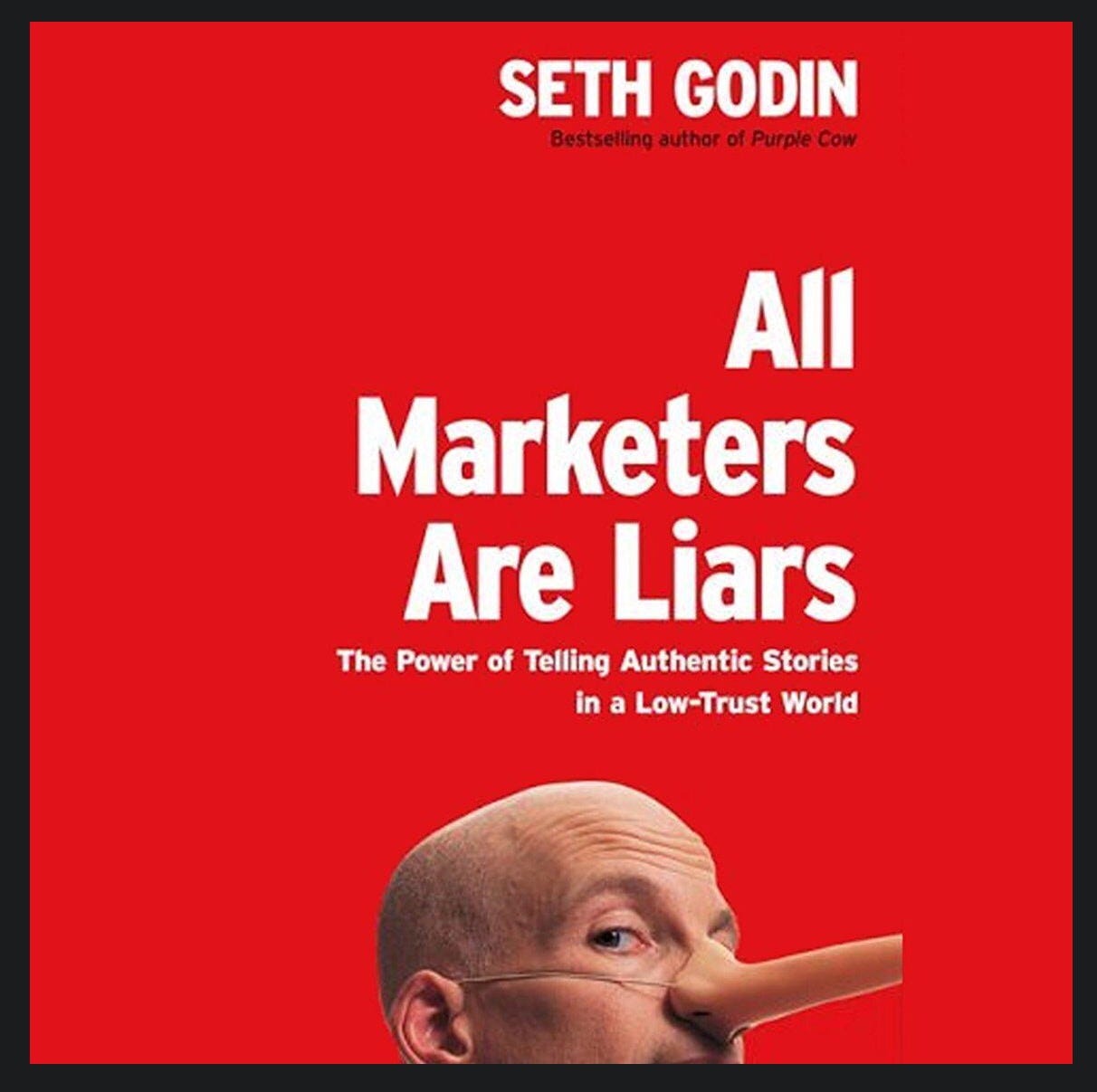All Marketers are Liars!
A few thoughts on storytelling, branding, and the little lies we all love to believe.
Let’s get this out of the way up front: Marketers are liars.
Well… not in the villainous, moustache-twirling, sell-you-a-timeshare-in-a-swamp kind of way. Most of us aren’t out here trying to fool anyone. We're just trying to sell a story that makes sense to people who are already halfway convinced.
And if you’re anything like me, you’ve bought something in the past—not because you needed it, but because the story around it made you feel a little cooler, a little smarter, or a little more “together” than you actually were.
That’s not manipulation. That’s just... human nature.
Seth Godin and the Little White Lies We Tell Ourselves

Seth Godin’s All Marketers Are Liars isn’t really about liars at all. It's about storytellers—people who understand that we live in a world where consumers (you, me, everyone) are constantly looking for stories to latch onto. Stories that help us make sense of our choices. Stories that justify spending too much on headphones or buying a standing desk or switching to oat milk.
Godin flips the narrative. He says the consumer is the real storyteller. The marketer just gives them a script.
And honestly, he’s not wrong.
You don’t buy a Tesla because you read the full technical spec sheet. You buy it because you want to say, “I care about the planet,” or maybe, “I like sleek things that make no sound and go fast,” or even just, “I’m not like other people.”
We buy into identities. Into meaning. Into emotion.
Not into logic.
It’s Not What You Sell—It’s the Story Around It
Let me tell you a quick story. Years ago, a friend of mine launched a line of luxury dog food. Organic, grain-free, wrapped in recycled packaging with a minimalist Scandinavian aesthetic. It was expensive. Like, dinner-for-two-at-a-fancy-restaurant expensive.
And yet, it flew off the shelves.
Why?
Because the story wasn’t “this kibble is healthier.” The story was, “you love your dog like family, and family deserves the best.” It played into guilt, love, pride, and aesthetics all at once. And it worked. People weren’t just buying food. They were buying the feeling of being a good dog parent.
That’s what good marketing does—it sells meaning, not matter. Emotion, not logic.
Why Authenticity Still Wins
Here’s the thing though. You can’t fake it forever.
Godin makes a big point about authenticity, and for good reason.
People today are cynical, especially in a world of curated perfection, influencer endorsements, and 100 versions of the same “we care” brand messaging. We’ve all developed a finely-tuned BS detector. And the moment your story starts to feel out of sync with reality, that trust starts to crack.
Consumers are smart. They’ll do their research. They’ll check reviews, scroll through Reddit threads, look at how you treat your staff, how you show up during a crisis, whether your values are consistent or just copy-pasted from a PR playbook.
If your story isn’t aligned with who you really are as a brand—someone will call it out. Loudly. And usually on Twitter.
So yes, storytelling matters. But only when it’s backed by substance.
The Worldview Lens
Godin also talks about worldviews—and this is where things get interesting.
People see the world through their own unique lens. Some want adventure. Others want security. Some want to feel part of something cool and new. Others want to preserve tradition. If your brand can tap into that worldview and mirror it back to them, you're not selling—you’re connecting.
And when that connection happens, it’s magic.
You’re no longer pushing a product. You’re becoming part of someone’s identity. A little piece of who they are. A quiet signal to the world that says, “This is me.”
But Wait, Isn’t That Manipulative?
Maybe. But so is every first date.
You put on your best shirt, make sure your hair’s right, say all the charming things and avoid talking about your weird hobby of collecting antique staplers. You're curating a story.
We all are.
Marketing, at its best, is just another form of human connection. It's about understanding what people care about—and reflecting that back to them in a way that feels honest, thoughtful, and aligned with who they are.
The bad marketing tries to trick you.
The good marketing just helps you tell a story you already wanted to believe.
Final Thoughts (and One Slightly Inconvenient Truth)
At the end of the day, we’re all a bit susceptible to well-told stories. It’s why we buy certain brands, follow certain influencers, or stick logos on our laptops like they mean something more than the device they came with.
And maybe that’s okay.
Maybe we need those little lies—so long as they’re not harmful, and so long as they help us feel just a little more... us.
So no, marketers aren’t the villains. We’re just the narrators.
And if you find yourself buying a bamboo toothbrush because it makes you feel like you’re saving the planet one molar at a time—just know, we’re cheering you on.
It’s a beautiful lie.
But it’s your lie.
Signing off for 84 Musing,
RV








